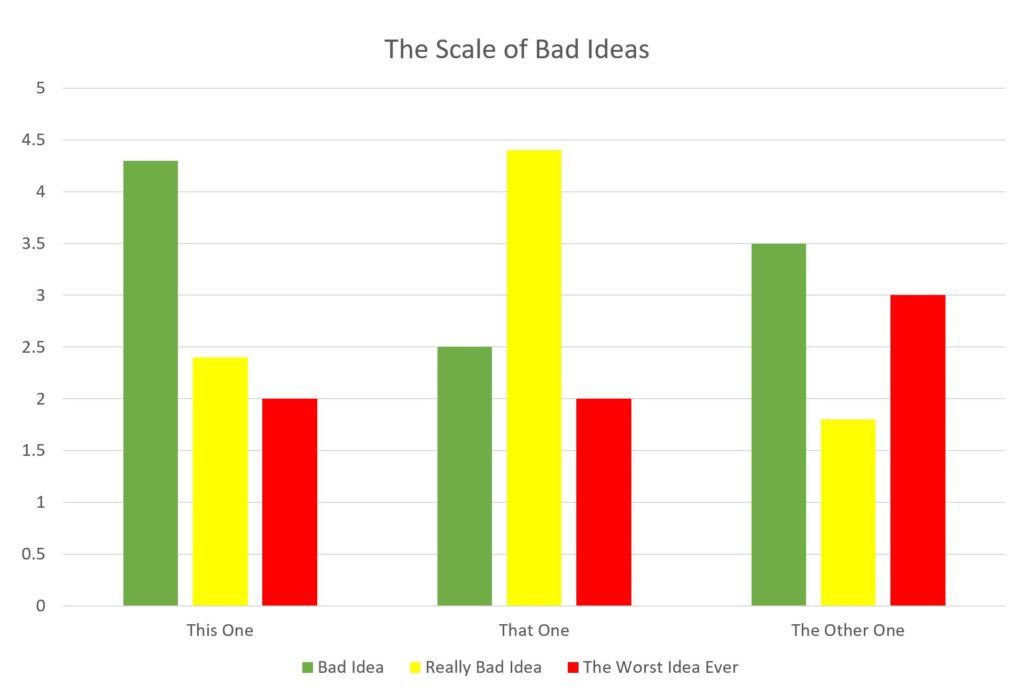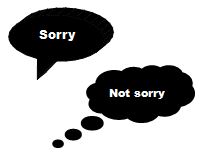Tag: work mistakes
5 Second Rule

The other day I was eating cake at my desk when I accidentally knocked the pan off the table. It landed frosting-side down on the carpet.
My first reaction was to panic in case the frosting had become smooshed into the carpet strands (it hadn’t). Then I laughed, calmly picked up crumb after crumb with my fingertips and got back to work.
I was glad I didn’t get frustrated about the mess and the time it took to clean up. I think my relief at not having to deep-clean a quarter inch of chocolate goop out of carpet fiber helped me relax and find the humor in it. But I also remember a flicker of a moment when I decided to think it was funny instead of a setback to my schedule.
Maybe the next time I have a setback with work, I’ll use that blink of time to lighten up, or steel myself, or to decide to shrug and let it go. Kind of like I did with the cake crumbs.
When Bad Ideas Happen to Good Employees
 Recently a friend told me a funny story about one of his coworkers. His company hired someone to help them cut costs and reduce wasted time and materials. Essentially, his job was to make the company run more efficiently to increase profitability.
Recently a friend told me a funny story about one of his coworkers. His company hired someone to help them cut costs and reduce wasted time and materials. Essentially, his job was to make the company run more efficiently to increase profitability.
I was immediately interested in this story because I’m a big fan of efficiency. Or maybe just a big hater of wasted time and money. Either way, I know a bit about Lean Manufacturing Principles and Rapid Improvement Processes and was curious to know what techniques this person was using.
One of the processes he implemented required everyone who worked in their office to keep three colored cups at their workspaces. If everything was fine, they were supposed to display a green cup on the corner of their desk. If they had a non-urgent issue, they used a yellow cup, and the red cup was for when they needed their manager immediately.
By this point in the story I was already laughing, imagining a room full of adults being told they needed to use plastic drinkware to signal how well they were managing their work throughout the day.
I have no idea why the efficiency expert thought this was a good idea, or why he tried to implement it without getting buy-in from the staff first. If he had asked for feedback, he would have realized that nobody wanted to announce to their entire office when they had an issue they couldn’t resolve on their own. Plus, when people had questions, they just asked them, so it was solving a problem that didn’t exist.
But he didn’t get their feedback first, so everyone had to suffer through an office full of people sabotaging a process while feeling foolish and irritated.
Leading a team through a Rapid Improvement Process can have the complete opposite result. The surface-level benefit is that a work process that was slow, wasteful, or otherwise unpleasant is transformed for the better. But the real win is the positive impact in morale. When people are asked how their tasks could function more smoothly and work together as a team to create solutions, they feel valued, they are given some control over their work environment, and they bond during the process.
Keep Calm Before You Hit Reply
 One time I was working on a global promotion with someone in another company that partnered with the one I worked for. We each had different contacts in our European offices, and emailed them back and forth while we tried to determine who exactly we needed to work with, and when we could speak with them. After a week or so, the person I had been working with stateside emailed me that we could share the details of the promotion at a reoccurring meeting with the exact European colleagues that we needed to talk to.
One time I was working on a global promotion with someone in another company that partnered with the one I worked for. We each had different contacts in our European offices, and emailed them back and forth while we tried to determine who exactly we needed to work with, and when we could speak with them. After a week or so, the person I had been working with stateside emailed me that we could share the details of the promotion at a reoccurring meeting with the exact European colleagues that we needed to talk to.
Great!
He forwarded the meeting invitation to me, and I quickly drafted a short explanation of the promotion and agenda for the next meeting occurrence, which I emailed to the meeting attendees.
What happened next was so awful that I still cringe when remembering it.
The meeting owner immediately replied to me and copied everyone who had been sent my original email, informing me that I was not permitted to hijack his meeting, I was completely unprofessional and he was going to tell my manager how rude I was, etc, etc. He wrote that he set up a new meeting series with a new conference call number that I wasn’t invited to, so there is no possible way I could join his meeting, ever. There were a lot of capitalized letters and exclamation points.
I was stunned. I got on the phone with the person from the other company to ask what happened. It turns out I wrongly interpreted his email to mean that he had organized our presentation with the meeting owner. What he meant was that the people we needed to speak with had regular meetings and we could try to get on their agenda.
Oh.
You know that saying, “When you assume you make an ass out of u and me”?
Yep.

I needed to do damage control but there was no way I was calling this guy. For one thing, there was a nine-hour time difference and it was too late at night to receive calls at his location. Also, I didn’t want to experience over the phone the same level of rage that came through his email.
I started drafting an email response but was so upset that it was difficult to know what to write. I was very sorry for my screw up but also defensive because I had acted in good faith. At the heart of the matter, the joint promotion I offered would help increase sales of a product that none of them were meeting their forecasts for.
I was also angry and offended by his words, and humiliated that he blasted me with 30 other colleagues on the email. I wasn’t ready to appreciate the irony of him labeling me as unprofessional.
So, my email response was not coming along very well. I got up from my desk in search of my manager or someone else who could advise me. Luckily, I ran into Jill. She is to this day the most unflappable business person I’ve ever met. I told her what happened and asked her advice.
She suggested that I reply to everyone on the email and in as few sentences as possible, explain my mistake and apologize – but to strip the emotion out.
I went back to my computer and wrote several more drafts until I had a version that sounded neutral. I hit “send”, went home, and dreaded what I would find in my inbox the next day.
I only received one email reply, from a colleague of the meeting owner. He wrote that he was embarrassed by his coworker’s email and apologized on his behalf. I never heard from the meeting owner again and forgot his name a long time ago.
What I remember, though, is how effective it was to reply to a heated email in a completely neutral tone. If I had responded in a way that sounded defensive, offended, or angry, I would have been adding fuel to an emotional situation. On top of making a careless mistake, I would have appeared as bad-tempered as the other guy. Instead, I looked mature and rational by taking responsibility for the situation and briefly explaining why I thought I had been on point for the meeting.
I try to remember to read my email responses out loud whenever I’m responding to someone else’s strong emotions. If I sound mild to my own ears, my text is probably fine. And when its about participating in someone else’s meeting? I do not assume.
Damage Control at Work
 Some of my worst moments at work were when I pissed somebody off. Fortunately, I can only remember a handful of times when someone was really angry with me. And even more fortunately, I learned early on in my career how to do damage control.
Some of my worst moments at work were when I pissed somebody off. Fortunately, I can only remember a handful of times when someone was really angry with me. And even more fortunately, I learned early on in my career how to do damage control.
I took a 12 week Dale Carnegie course that changed my life for the better in many ways, and learning to recover when someone became angry with me at work is one of them. I recommend the course to anyone who wants to improve at public speaking, human relations and leadership. But if you just want me to get to the point about damage control, here it is:
Say that you were wrong.
Or the way Dale Carnegie states it in his Principles from How to Win Friends and Influence People: “If you are wrong, admit it quickly and emphatically.”
I had just learned about this principle when I managed to piss off an entire team of people that I was working with at the time. Upper management had decided that I would take over a program that they had been responsible for and I jumped in without discussing the change with them.
When the situation blew up, I felt terrible. I should have scheduled a meeting with them and positioned the change as a way to alleviate some of their  workload. Instead, it came across as if I was stealing their project without considering what they wanted.
workload. Instead, it came across as if I was stealing their project without considering what they wanted.
I immediately went to each person and apologized, said that I was wrong, and asked if we could have a meeting to make a group decision about how to manage the program in the future.
I remember those conversations very clearly. They all responded to me graciously and thanked me for approaching them. Sincerely acknowledging that I was wrong made me vulnerable and was disarming. I didn’t bring defensiveness or justifications to the conversations so there were no battles.
The nervousness that I felt when I knocked on their office doors was much less painful than the remorse and anxiety of upsetting them and making a mistake that could have damaged my career. By doing immediate damage control, my career wasn’t damaged at all. In fact, those team members had more respect for me than they did before; our working relationships improved.
That experience made a deep impression on me. I’ve only made a few fury-inducing work mistakes since then and am grateful I that I know how to manage them.

Recent Comments